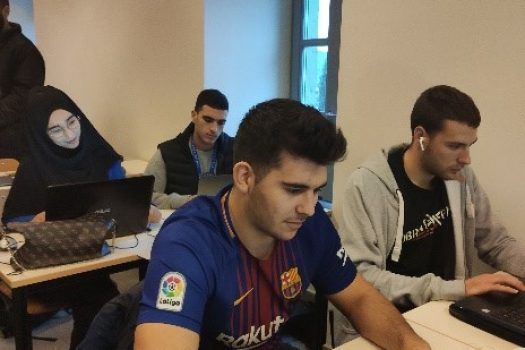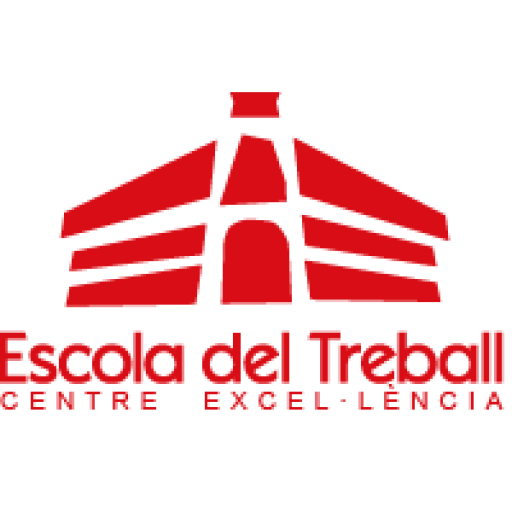


The promotion of European mobilities is one of Institut Escola del Treball strategic lines. We offer our students the possibility of taking part in mobility periods abroad, both on work placement in companies and study periods in partner schools by taking part in Erasmus+ Key Action 1 projects (both VET and Higher Education). We also offer teachers the possibility of spending some time abroad, either by taking part in structured training courses or by teaching in partner institutions. Consequently, we also apply for funding under Key Action 1 projects for teachers.
In order to comply with the quality requirements of our institution, we have developed a series of actions such as the elaboration of procedures related to the management and development of the different European projects and of all the documentation associated to them. This has allowed us to establish a protocol which has become part of our institution management system. In order to monitor the execution of these actions we have also associated indicators to the corresponding activities that give us the picture of how well we are doing. The results will eventually allow us to modify, correct and improve the way we manage our European projects.
Moreover, about 20% of our teachers are fluent in a foreign language and have already attended training on AICLE methodology. This implies that they are able to teach some formative units in English or French, which results in a better preparation for those students that will eventually take part in mobilities. This is also a good tool we implement when receiving students from abroad, as it is much more easier for them to follow lessons during their study mobility periods at our end. As stated before, it is in our policy as a vocational education institution to encourage our staff to participate in mobilites with our partner schools with the aim of teaching or receiving training. We hope that our teachers’ good level in foreign languages might motivate our students to overcome language barriers which are usually a drawback when going abroad. Furthermore, we believe that our teachers gain form this experience as it is the means of exchanging materials, resources, methodologies and eventually gain an overall perspective of the learning and teaching in their professional field.
How do we choose our partners
Belonging to Netinvet Association (a network that promotes mobilities among training centres in the fields of International Trade and Transport and Logistics), has given us the opportunity to meet and get to know other training centres that provide the same qualifications. So, when dealing with these studies we frequently use this network to look for companies or schools for work placement and study mobilities. All these companies and training centres comply with a quality chart that make us confident that our students will be well cared for and will obtain the most of their stay.
For other qualifications, such as Electricity or Chemistry, we have established a long term relationship with training centres over Europe which have already been working with us in other European programmes, such as Comenius and Leonardo. Our joint work in these programmes has proved satisfactory and we have developed mutual trust. Being this last issue, the one that we value the most when starting new partnerships.
As for the geographical areas, we intend to look for areas in Europe where the different sectors related to the studies we offer have major relevance. This is, why we try to establish links with companies and training centres in France, Germany and the Netherlands for our logistic students. Other countries and geographical areas are taken into consideration when dealing with our other study fields (Chemistry, Electricity and Electronics, Administration, Trade, Renewable Energies and Environmental Education).
Target groups
And, finally, our target groups are those students following any of the qualifications stated above. These studies provide a level 3 and a level 5 qualification of the European Qualification Framework. Most of them incorporate contents which can be better dealt with in other geographical areas others than our own. For example, students from Environmental Education and Quality Control have their eyes set in Finland where the variety of natural parks offers them great possibilities of expanding their education. Contacts between training centres have already been started. Nevertheless, we believe that our Logistics, International trade and Management assistant students are the ones who should benefit more of the experience as a good command on foreign languages is a key issue in their future profession. Moreover, they should be able to overcome cultural barriers if they want to succeed. Their mobility experiences will undoubtedly enrich their training.
Our institution’s strategy for the organisation and implementation of international cooperation projects in teaching and training
At Institut Escola del Treball we do believe that long term cooperation among Vocational Tertiary Education training centres around Europe is of the utmost importance. This means that the joint work together will undoubtedly provides a full knowledge of the institutions involved and consequently generates full trust. Moreover, staff can exchange knowledge, resources and methodologies which result on a better preparation of our students. This cooperation also provides a framework where good practices are detected, analysed and exchanged. Thus, staff largely benefits from this cooperation. So far, our involvement in the Netinvet network has proved to be of great help by giving us the opportunity to get involved in long term projects with higher institutions which offer the same qualifications and share our same objectives and expectations related to teaching development. This has lead the staff of both institutions to start a joint work together which will undoubtedly result on a higher professional development.
Entrepreneurship and innovation projects are two of the key issues at our end. Thus, the cooperation with European training centres and European stakeholders, especially enterprises and professional organizations, is of great help in order to develop both the entrepreneurial attitude and the creativity in our students. So far, we have already established some alliances with companies in other European countries which we believe is the first step towards the establishment and further development of innovation transfer practices.
The variety of the qualifications we offer will undoubtedly enlarge our network of training centres and companies which we hope will result on the internationalisation and consequent modernization of higher vocational education and training. We hope to both benefit and contribute to this goal.
Expected impact
Priority 1. Increasing attainment levels and strengthening the social dimension of higher education: Our training centre is currently working on increasing the number of students who continue their education by implementing strategies that we hope will encourage those students who are prone to dropping out to qualify, at least, in some formative units. The European dimension and, consequently, the possibility of doing part of their training abroad will undoubtedly encourage these students to continue their educational path.
Priority 2. Improving the quality and relevance of higher education, including through cooperation between higher education institutions and the labour market: Institut Escola del Treball is currently committed with most of the companies in Lleida in a joint work for the development of dual training. This gives both the teachers and learners the possibility of an up-to-date training. Companies take part in decisions such us the choice of the formative units that can be developed in the companies. It goes without saying that a joint work between the labour market and the training centre will also enhance the training possibilities of our partner schools by being able to send their students to us to take part in such a project. Moreover, our school is specially committed to quality development which we consider an important step towards gaining trust among our European partners.
Priority 3. Strengthening quality through mobility and cross-border cooperation: Institut Escola del Treball has already started working in the recognition of the learning done abroad. Agreements with our partner schools allow us to send and receive students for study periods. We have already done a great job by scheduling formative units and deciding on the learning outcomes to be achieved. We are currently working on decisions related to the ECTS or ECVET points and have also got involved in the ECVET Team. Being able to provide full learning recognition will undoubtedly have a great impact in our students expectations.
Priority 4. Making the knowledge triangle work: Linking higher education, research and business for excellence and regional development: Institut Escola del Treball is currently implementing entrepreneurship as one of its strategic lines. We do believe that entrepreneurial attitude will undoubtedly provide the tools for a better incorporation of our students in the labour market. So far, our partner schools are also working on this issue, which will allow our students taking part in mobilities to gain a better preparation.
Priority 5. Improving governance and funding: Although our government is working towards the autonomy of their training centres, it is not yet well developed. Nevertheless we focus on being able to determine the profile of some of our teachers as the qualifications we offer are quite specific. This would allow us improve our teaching. Both our and the partner’s students will undoubtedly benefit from this fact.
Presentació de la Jornada d’informació del Programa Erasmus
Si us interesa, podeu baixar-vos el document de sol·licitud de mobilitat internacional.
Sol·licitud de mobilitat internacional
The Erasmus Charter for Higher Education provides the quality framework for Erasmus+ funded activities carried out by an institution.
Erasmus+ aims support the European modernisation and internationalisation agenda in higher education, in particular the quality of student and staff mobility. By signing an ECHE, an institution confirms that its participation in Erasmus+ is part of its own strategy for modernisation and internationalisation.
